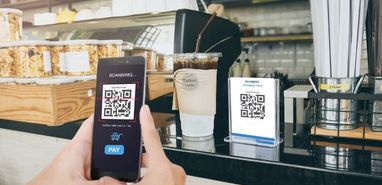
The restaurant industry is experiencing a digital revolution, with Decentralized Finance (DeFi) emerging as a key player in optimizing financial operations. Leveraging blockchain technology, DeFi offers a groundbreaking alternative to traditional payment systems by reducing costs, improving transaction speed, and enhancing security. With its ability to streamline operations and boost profitability, DeFi represents a significant opportunity for the restaurant sector.
The Rise of Digital Payment Solutions in Restaurants
The adoption of digital payment systems has skyrocketed in recent years, transforming how restaurants manage transactions. In 2023, the global point-of-sale (POS) terminal market reached a valuation of over $110.9 billion, and it is expected to grow at a compound annual growth rate (CAGR) of 7.5% from 2024 to 2032. This rapid growth is driven by the increasing use of cloud-based POS systems and government initiatives aimed at promoting cashless transactions.
In parallel, the DeFi ecosystem is experiencing unprecedented growth. As of now, the Total Value Locked (TVL) in DeFi protocols stands at $86.57 billion, while the stablecoins market cap exceeds $173 billion, signaling the transformative potential of blockchain technology in the financial landscape.
Challenges Faced by Traditional Payment Systems
Despite their widespread adoption, traditional payment systems in the restaurant industry come with significant drawbacks:
- High Transaction Fees:
Credit card processors typically charge fees ranging from 1.5% to 3.5% per transaction. Delivery platforms like DoorDash and Uber Eats add further pressure by imposing commission rates of 15% to 30% on each order, eating into profit margins. - Delayed Settlements:
Payments processed through conventional systems often take several days to settle, creating cash flow challenges for small and medium-sized restaurants. - Cybersecurity Risks:
Relying on third-party processors exposes businesses to potential fraud and data breaches, compromising financial security.
How DeFi Can Revolutionize Restaurant Payment Systems
DeFi addresses these challenges by offering decentralized, blockchain-based solutions that remove intermediaries and create cost-effective, secure, and transparent payment systems.
Key Benefits of DeFi Integration:
- Lower Transaction Costs
DeFi eliminates the need for third-party intermediaries, significantly reducing transaction fees. For example, Layer 2 blockchain solutions further optimize costs, allowing restaurants to save substantial amounts across thousands of transactions. - Faster Settlements
Blockchain-based payments are nearly instantaneous, providing restaurants with real-time liquidity. This faster cash flow can be a game-changer for managing day-to-day expenses like inventory and payroll. - Enhanced Security and Transparency
Blockchain creates an immutable ledger of transactions, reducing the risk of fraud and disputes. DeFi platforms also offer unparalleled transparency, enabling restaurants to track payments with precision. - Innovative Loyalty Programs
DeFi opens doors for token-based loyalty programs. Restaurants can issue custom tokens that customers can redeem for discounts, exclusive offers, or convert to stablecoins. This approach enhances customer engagement, particularly among tech-savvy demographics.
Image Credit: deliverect
Practical Applications of DeFi in Restaurants
- Stablecoins for Payment Processing
Cryptocurrencies like USDC and DAI, which are pegged to fiat currencies, offer stability and lower transaction costs. Accepting stablecoins allows restaurants to bypass the volatility associated with other cryptocurrencies like Bitcoin, while enjoying quick settlements.Implementation Tip:
Restaurants can integrate wallet options for stablecoin payments into their POS terminals and online ordering systems, providing a seamless experience for customers. - Smart Contracts for Automation
Smart contracts can automate recurring payments such as payroll, supplier payments, or utility bills. For instance, a restaurant could program a smart contract to release funds to suppliers biweekly, streamlining accounts payable processes and reducing manual intervention. - Tokenized Rewards Programs
Restaurants can create loyalty tokens that incentivize repeat visits. These tokens can be exchanged for stablecoins or used within the restaurant for discounts, fostering a unique engagement model and boosting customer loyalty.
Overcoming Challenges in DeFi Adoption
While the benefits of DeFi are compelling, integrating this technology into restaurant payment systems is not without challenges. Here’s how to address them:
- Regulatory Compliance
The legal framework for cryptocurrency varies by region, making compliance a complex task. Restaurants should consult legal experts to navigate digital payment regulations and ensure adherence to local laws. - Customer Education
DeFi is still unfamiliar to many consumers. Providing easy-to-understand guides on setting up digital wallets and using stablecoins can help bridge the knowledge gap and drive adoption. - Technical Infrastructure
Implementing DeFi solutions requires robust infrastructure. Restaurants may need to upgrade their POS systems and ensure reliable internet connectivity. Partnering with technology providers can simplify the integration process.
Step-by-Step Guide to DeFi Implementation
For restaurants considering DeFi integration, the following steps can facilitate a smooth transition:
- Assess Compatibility
Evaluate how DeFi can integrate with your existing POS and online systems. - Choose the Right Platform
Research DeFi platforms and stablecoins like USDC, DAI, or Celo to align with your business goals. - Educate Staff and Customers
Train employees on handling DeFi transactions and create customer resources to promote adoption. - Monitor Regulatory Changes
Stay updated on local and international regulations to ensure compliance with evolving laws.
Image Credit: deliverect
The Future of DeFi in the Restaurant Industry
As DeFi technology and regulations evolve, its potential applications in the restaurant industry are set to expand. Beyond payment processing, DeFi can revolutionize areas like automated financing, supply chain management, and payroll systems. By embracing DeFi, restaurants can gain greater control over their finances, reduce operational costs, and enhance overall efficiency.
In the long term, DeFi could pave the way for a fully decentralized restaurant economy, where every transaction—from supply chain logistics to customer payments—operates on blockchain technology. This shift would empower restaurant owners, minimize dependence on costly intermediaries, and unlock new opportunities for innovation.
Conclusion
DeFi represents a transformative opportunity for the restaurant industry, offering cost-effective, secure, and efficient payment solutions. By integrating DeFi into their operations, restaurants can stay ahead of technological trends, improve financial management, and enhance customer experiences.
The journey to DeFi adoption may come with challenges, but with the right strategy, the rewards are well worth the effort. As blockchain technology continues to mature, the restaurant sector stands on the brink of a decentralized future that promises greater autonomy, transparency, and profitability.








By Radoslav Jokic
Updated on 9th March 2025